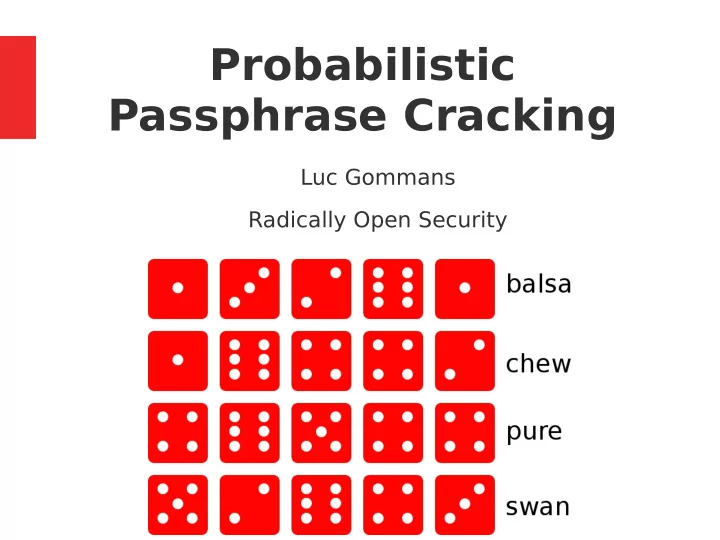

Probabilistic Passphrase Cracking Luc Gommans Radically Open Security
Contents 1. Introduction 2. Prior Work 3. Research Question 4. Methods 5. Results 6. Conclusions 7. Future work 2
What are passphrases? ● balsa chew pure swan ● I have got a nice bike 3
Prior Work ● 2012 Labrande Hybrid dictionary attack ● 2016 Sparell and Simovits Markov chains ● 2017 Gaastra, Gijtenbeek and Gommans Using lyrics and famous quotes 4
Research Question How can software efciently generate likely passphrases, to be used in passphrase cracking? ● Efcient: – Computational power – RAM – Storage ● Likely: – Results 5
Contribution ● Compare diferent methods ● Implement a new method – Make previous work directly comparable 6
Hybrid dictionary attack ● Reproduced Labrande‘s work – Training dataset – Efectiveness comparison ● Dictionary of phrases + sets of rules – Lowercase all, remove spaces, etc. 7
Probabilistic Method Selection ● Markov chains done by Sparell and Simovits ● Probabilistic Context-Free Grammar applied to passwords successfully ● N-grams popular in text prediction 8
Context-Free Grammar S → NP VP NP → Det N | W VP → V NP W → I | he | she | Joe Det → a | the | my | his N → elephant | cat | jeans | suit V → kicked | followed | shot ● I followed Joe ● a cat shot my elephant 9
Probabilistic Context-Free Grammar ● NP → 0.7(Det N) | 0.3(W) ● Generate probabilities and rules based on texts – Word classifcation database 10
N-grams ● „have we lost or have we won“ n=2 – 2 have we – 1 we lost – 1 lost or – 1 or have – 1 we won → have we won 11
N-grams ● Generated weighted statistics from: – Wikipedia articles – Previously cracked passphrases ● Cracking by taking the most frequently occurring n-gram and fnding continuations 12
Results Efectiveness ● Hybrid dictionary (Labrande) – 4.2M phrases of Korelogic ( 200k of ≥16 characters) ● Hybrid dictionary (ours) – 2.3M phrases of Korelogic ( 147k of ≥16 characters) – 1.3M phrases of LinkedIn ( 13k of ≥16 characters) ● Markov chains – 25k phrases of LinkedIn ( 384 of ≥16 characters) ● N-grams – 835k phrases of Korelogic ( 33k of ≥16 characters) – 482k phrases of LinkedIn ( 4k of ≥16 characters) 13
Results Efciency ● Hybrid dictionary – Speed: >10 000 000 pps (phrases per second) – Storage: medium (690MiB) ● Markov chains – Speed: 2 500–22 500 pps – Storage: unknown ● N-grams – Speed: 3 300 000 pps – Storage: low-medium (47-464MiB) 14
Conclusions ● Hybrid dictionary is efcient and efective ● N-grams most efective when length of phrase ≤ n 15
Future work ● Better language modeling using n-grams ● Probabilistic Context-Free Grammar ● Neural Networks 16
Thank you ● Thanks to Radically Open Security ● See our git repository for GPLv3 licensed: – N-gram phrase generator & models (n=2 and n=3) – Phrase dictionary & rules – Slides and preview of the paper github.com/radicallyopensecurity/passphrase-cracking ● Questions? 17
Recommend
More recommend